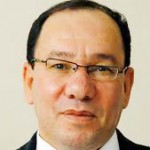Egyptian columnists have recently been inundating their readers with analyses of the root causes of internal clashes hitting the infrastructure of the salafist Al-Nour party. Some have put the blame on the party’s lack of experience in the political arena.
Other writers explore the recent developments taking place in Sinai, especially in Rafah, where Christian families have been fleeing the city after receiving death threats. Many are calling upon the government to restore order in the peninsula and safeguard the Coptic community.
Wael Qandil
A national shame
Al-Shorouk newspaper
Egyptians deserve an explanation of the recent developments in the Sinai Peninsula, particularly in Rafah. Qandil states that the entire Egyptian community has been outraged after Christian families fled the city following death threats from suspected Islamic militants last week. The writer refutes arguments that suggest the immigration of Coptic families is solely sectarian. He also rejects suggestions that radical extremists in Sinai are the root cause of this new trend.
The current message, coming through loud and clear, is that the authorities are failing to protect the Coptic community. Qandil states that the more passive and silent the Egyptian government is on this issue, the easier it will be for the country to believe that the government has been cowed by an increasing Islamist militant threat in Sinai. At a time when the authority remains silent amid unacceptable new reports, Qandil thinks that extremist parties must be making plans to literally occupy the whole land.
Emad Al-Din Hussein
Safwat Al-Sherif’s ghost
Al-Shorouk newspaper
The recent conflicts taking place inside the salafist Al-Nour party suggest that Egypt still needs a lot more time to enjoy a healthy democratic life. Hussein notes that Emad Abdel-Ghafour, the ex-head of Al-Nour, dismissed some members of the party and then ended up being suspended himself. The situation has become more polarised as every faction within the party thinks they have taken the right decision.
The situation reminds Hussein of the old political parties that used to operate alongside the National Democratic Party (NDP). At that time, many parties used to strive for a license from Safwat Al-Sherif, former speaker of the Shura Council, endorsing a fake democratic process.
As soon as a party decided to join the opposition, inner conflicts arose. The main objective was to keep the NDP in power, and dominant. Hussein hoped to see such the end of such scenarios with the eruption of the 25 January revolution. However, the clashes inside Al-Nour seem to have revived the false democratic era of Al-Sherif.
If the salafist party decides to follow the example of the Mubarak era opposition parties, the writer ironically suggests that Egyptians ought to apologize to Al-Sherif. Ultimately, Hussein thinks that Al-Nour have failed to provide a genuine democratic opposition, despite seizing a quarter the seats of the parliament. Egypt’s road to democracy is indeed long and arduous.
Salah Hassab-Allah
What the Constituent Assembly is for
Al-Watan newspaper
The first priority for building Egypt’s political future is finalising the constitution, states Hassab-Allah. He explores the pros and cons of the constituent assembly and praises the efforts of almost all members of the body, who seek to prepare a worthy constitution and compensate for the past 30 years of Egyptian suffering. Hassab-Allah then examines the mechanics through which the constituent assembly is operating.
Forming the assembly from a wide range of law professors and dividing them into separate branches gives the impression that the members are isolated from each other. Whoever works in the system of governance committee, for example, is unaware of the developments occurring in the freedoms committee. The writer suggests that this separation is exacerbated by the frequent controversial statements coming from assembly members.
Hassab-Allah condemns the administration of the assembly, claiming that Hossam Al-Gheriany, the head of the body, always clashes with those who oppose his ideas. This has been evident from watching the live-streamed assembly sessions on Sout Al-Shaab TV channel. Finally, the writer laments the fact that 13 members of the assembly hold high-ranking positions as ministers or governors, leading to a confusing overlap of authorities, states Hassab-Allah.
Mohamed Shoman
Al-Nour and the Islamic method
Al-Watan newspaper
There are several explanations as to why the inner conflicts of Al-Nour party were initially triggered, states Shoman. In his view the lack of political experience of most of the party’s members is mostly to be blamed. The party has never been an active member in the Egyptian political arena. It misses a fortified skeleton, which makes the entire party vulnerable to destruction.
Moreover, Shoman believes that the strong wave of extremism associated with the salafist front in Alexandria could be behind the escalating ideological clashes between Al-Nour members.
He argues that the dispute is linked to a chronic illness of the liberal, socialist and Islamist parties, which relate to each other with a sense of arrogance, short-sightedness and selfishness. The writer asserts that both the salafists and the Muslim Brotherhood repeat the same mistakes of other parties, and keep dealing with each other on the basis of hatred and hostility.
Despite the differences displayed in most of the points presented by Shoman, the writer believes they all constitute a general elaboration on the root cause of the conflict between members of Al-Nour. The salafist movement needs to admit the basic terms of democracy and declare its respect for public freedoms, according to Shoman.
Emad Gad
Islamist and secular coalitions
Al-Tahrir newspaper
In preparation for the upcoming parliamentary elections, Gad states that sources in the Freedom and Justice Party (FJP) are said to be seeking coalitions with other liberal and leftist parties, rather than limiting their alliances to Islamist parties. The writer condemns the way some Islamist political movements describe any secular coalition as destructive to their Islamic project.
He recalls statements of ex-presidential candidate Hazem Abu Ismail, who went as far as describing non-theocratic alliances as the complete opposite of Islamic thought. Amid these developments, the writer criticises how the large Islamist parties are striving to hold their first general conference to restructure the hierarchy of their bodies.
Gad then refers to the inner conflict hitting Al-Nour and anticipates that the struggles will negatively affect the party’s participation in the coming elections. However, Gad still expects that the remaining Islamist parties will manage to attract many voters while misusing religion in their political speech.
Finally, it is obvious why political parties seek to establish coalitions. It is important that Egyptians should deal with these alliances as trials in the coming democratic process, rather than solely entities that play around with religion to achieve personal benefits.








